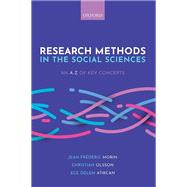Research Methods in the Social Sciences is a comprehensive yet compact A-Z for undergraduate and postgraduate students undertaking research across the social sciences, featuring 71 entries that cover a wide range of concepts, methods, and theories.
Each entry begins with an accessible introduction to a method, using real-world examples from a wide range of academic disciplines, before discussing the benefits and limitations of the approach, its current status in academic practice, and finally providing tips and advice for readers on when and how to apply the method in their own research. Wide ranging and interdisciplinary, the text covers both well-established concepts and emerging ideas, such as big data and network analysis, for qualitative and quantitative research methods.
All entries feature extensive cross-referencing, providing ease of navigation and, pointing readers to related concepts, and to help build their overall understanding of research methods.








